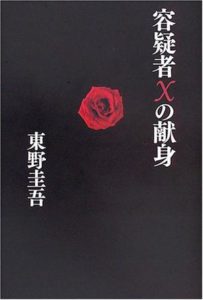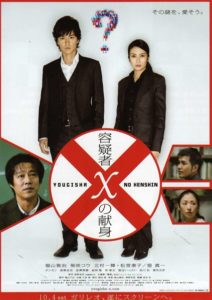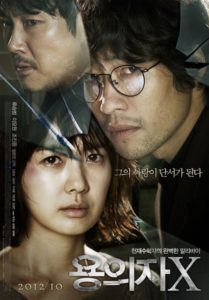The Devotion of Suspect X
嫌疑人X的献身
China, 2017, colour, 2.35:1, 112 mins.
Director: Su Youpeng 苏有朋 [Alec Su].
Rating: 6/10.
Chinese version of a well-known Japanese mystery novel is good-looking but poorly cast.
Jiangbei city, northern China, Apr 2016. The body of a naked man, with his jaw smashed and fingers burned, is found strangled by the river bank. Nearby is a rented bike whose front tyre has been punctured. The police, led by detective Luo Miao (Ye Zuxin), discover the bike was rented by a man called Fu Jian (Zhao Yang), 42, and that the victim died on the evening of 12 Apr. Fu Jian had no family or relatives and was of no fixed address. The police have three suspects: gamblers Wu Daqing (Ren Xiqing) and Hu Gang (Feng Chong), with whom Fu Jian had quarrelled over money, and his ex-wife Chen Jing (Lin Xinru). Luo Miao questions Chen Jing, who lives with her 14-year-old daughter Chen Xiaoxin (Deng Enxi) in a scungy part of the city and runs a small snack bar uptown. She says she and her daughter went to the cinema that evening. Luo Miao also questions her neighbour in the flat next door, high-school maths teacher Shi Hong (Zhang Luyi), who says he heard nothing that night and has little to do with them anyway. Luo Miao discusses the case with his friend Tang Chuan (Wang Kai), a physics professor who has a lab at the Jiangbei Police Academy and also lectures students there on solving crimes. Tang Chuan recognises Shi Hong’s name: they were friends as high-school students (Hou Minghao, Yan Xujia), drawn together by a shared interest in solving brainteasers, though Tang Chuan hasn’t seen Shi Hong for 16 years. Tang Chuan visits Shi Hong at his flat and they spend an evening together, reviving their friendship and mental sparring. Next morning, Tang Chuan accompanies Shi Hong to work, walking along the river with him and seeing how he always buys a lunchbox from Chen Jing’s snack bar. Meanwhile, Chen Jing’s alibi for the evening of 12 Apr is confirmed, though Luo Miao still has his suspicions. When he asks Tang Chuan whether Shi Hong could have been involved, Tang Chuan says Shi Hong is a brilliant mathematician, not a murderer. But he then asks to review the case files himself. From a strange remark made by Shi Hong, Tang Chuan concludes that Shi Hong is in love with Chen Jing and helped her in some way. Meanwhile, when Shi Hong learns that Chen Jing has started seeing an old regular, the now-widowed Teng Kun (Cheng Taishan), from her days as a nightclub hostess, he orders her to break up with him immediately.
REVIEW
After his debut as a director with the refreshingly different youth drama The Left Ear 左耳 (2015), Taiwan actor-singer Su Youpeng 苏有朋 [Alec Su], 43, bites off rather more than he can chew with his second directorial outing, crime/psycho-drama The Devotion of Suspect X 嫌疑人X的献身. Based on the 2005 novel 容疑者Xの献身 by Japanese mystery writer  Higashino Keigo 东野圭吾 – already filmed twice – it’s a real curate’s egg, technically very proficient but badly let down by some of the lead casting and an overall lack of dramatic architecture. It’s simply not as gripping as it promises to be, delivering neither as a tense battle of wits between two academics nor as a labyrinthine solving of a “perfect crime”. Like Black Coal, Thin Ice 白日焰火 (2014) – another crime drama in a drab Mainland setting that didn’t realise its potential – The Devotion of Suspect X is part genre spin and part stylised psychodrama that’s directed by someone who doesn’t have a natural feel for the genre. Partly thanks to Higashino’s name, the film performed well on release in the Mainland, grossing RMB392 million, though still below the level of Su’s surprise hit Left Ear (RMB485 million).
Higashino Keigo 东野圭吾 – already filmed twice – it’s a real curate’s egg, technically very proficient but badly let down by some of the lead casting and an overall lack of dramatic architecture. It’s simply not as gripping as it promises to be, delivering neither as a tense battle of wits between two academics nor as a labyrinthine solving of a “perfect crime”. Like Black Coal, Thin Ice 白日焰火 (2014) – another crime drama in a drab Mainland setting that didn’t realise its potential – The Devotion of Suspect X is part genre spin and part stylised psychodrama that’s directed by someone who doesn’t have a natural feel for the genre. Partly thanks to Higashino’s name, the film performed well on release in the Mainland, grossing RMB392 million, though still below the level of Su’s surprise hit Left Ear (RMB485 million).
 Higashino’s novel is the third in his so-called Detective Galileo series, centred on a physics professor who helps the police solve crimes with his well-honed powers of deduction. In The Devotion of Suspect X his “opponent” is a brilliant but socially withdrawn mathematics teacher with whom he used to mentally spar at high school and who may be somehow connected with the murder of his next-door neighbour’s ex-husband. The 2008 Japanese adaptation, Suspect X 容疑者Xの献身, directed by Nishitani Hiroshi 西谷弘 (see poster, left), was a solid, if rather digressive, adaptation with two charismatic male leads (Fukuyama Masaharu 福山雅治 as the prof, Tsutsumi Shinichi 堤真一 as the teacher) but also with an annoyingly mouthy female detective (played by Shibasaki Ko 柴咲コウ). The subsequent South Korean version, Perfect Number 용의자X (2012), directed by actress-
Higashino’s novel is the third in his so-called Detective Galileo series, centred on a physics professor who helps the police solve crimes with his well-honed powers of deduction. In The Devotion of Suspect X his “opponent” is a brilliant but socially withdrawn mathematics teacher with whom he used to mentally spar at high school and who may be somehow connected with the murder of his next-door neighbour’s ex-husband. The 2008 Japanese adaptation, Suspect X 容疑者Xの献身, directed by Nishitani Hiroshi 西谷弘 (see poster, left), was a solid, if rather digressive, adaptation with two charismatic male leads (Fukuyama Masaharu 福山雅治 as the prof, Tsutsumi Shinichi 堤真一 as the teacher) but also with an annoyingly mouthy female detective (played by Shibasaki Ko 柴咲コウ). The subsequent South Korean version, Perfect Number 용의자X (2012), directed by actress- turned-director Bang Eun-jin 방은진 | 方银振 (see poster, below left), took major liberties with the source material, getting rid of not only the female detective (good idea) but also the physics professor (bad idea), thus robbing the story of one of its main dramatic planks, the battle between two brainiacs. Despite an interesting start, it fizzled in the second half.
turned-director Bang Eun-jin 방은진 | 方银振 (see poster, below left), took major liberties with the source material, getting rid of not only the female detective (good idea) but also the physics professor (bad idea), thus robbing the story of one of its main dramatic planks, the battle between two brainiacs. Despite an interesting start, it fizzled in the second half.
Su’s version – scripted by no less than six people, including Taiwan’s Li Jiaying 李佳颖, who co-wrote Left Ear, and Mainlanders Huang Hai 黄海 (My Lucky Star 非常幸运, 2013, as Huang Xuhai 黄旭海) and Feng Yuanliang 冯元良 (The Coffin in the Mountain 殡棺, 2014) – also ditches the female detective but otherwise parallels the Japanese film version pretty closely, from the river-front walk every day by the teacher to whole chunks of dialogue and many whole scenes. The major structural innovations by Su’s team are (a) to have flashbacks to the two main characters during their friendship at high school and (b) to show the actual murder much later in the film (over half an hour in, rather than 10 minutes as in the Japanese version). Both are improvements: the first backgrounds the men’s present-day relationship and the second is more meaningful coming after all the characters have been properly introduced and the audience has built up some curiosity over what actually happened that night.
Unfortunately, these structural improvements are undermined by the casting of the two leads. TV actor Wang Kai 王凯, 34, who was okay as a humorous sharpshooter in Railroad Tigers 铁道飞虎 (2016), plays the physics prof as a fashion-plate control freak with little sense of irony or real intellectual sharpness. Even worse cast is TV-theatre actor-director Zhang Luyi 张鲁一, 37, who was so good with his grandstanding performance as a producer in Love on the Cloud 微爱之渐入佳境 (2014) but here plays the introverted, lovesick maths teacher almost as a parody of a hangdog loser. Largely thanks to Zhang’s performance, but also partly to Wang’s, there’s little chemistry between the two actors, and even less sense of what should be an intellectual duel between two brilliant minds as the latter tries to bamboozle the former by constructing a fake alibi. The idea didn’t really get off the ground properly in the Japanese version, but the two leads in that were at least empathetic on a filmy level.
The film’s male chemistry isn’t helped, either, by the casting of the boyish-looking TV actor Ye Zuxin 叶祖新, 33, as the investigating cop, who hardly comes over as a proactive figure. The film’s best performance in fact comes from Taiwan actress Lin Xinru 林心如 [Ruby Lin], 40, as the woman in the middle – both a suspect and the object of the maths teacher’s “devotion”. Lin, who co-starred with Su way back in the mega-hit TV drama series Princess Returning Pearl 还珠格格 (1998), is nicely cast and gives an unexpectedly nuanced performance; she’s entirely believable as a “nice” mother with a past, whereas Matsuyuki Yasuko 松雪泰子 in the Japanese version was simply nice. Lin’s performance adds an extra level to the film that almost brings some real emotion to the late-on confession scene between her character and Zhang’s. But it’s not enough to bring the necessary oomph to a film that’s as much a quirky love story (and the lengths that love makes one go to) as it is a crime drama.
The lead actors can’t be entirely blamed for the film’s emotional coolness. Though it’s technically a fine piece of work, with the widescreen work of Chinese American d.p. Wang Dayong 汪大勇 [Max Wang] (What Women Want 我知女人心, 2011) creating a semi-noirish look out of the drab Harbin locations/sets for the fictional northern town of Jiangbei, and experienced Hong Kong editor Li Dongquan 李栋全 [Wenders Li] delivering a tight product, the film as a whole has no sustained drama or sense of tension. The nothing score by Japan’s Oshima Michiru 大岛满 (Kora 转山, 2011) is partly to blame, but the lack of dramatic architecture also stems from a combination of flaws in the script, Su’s direction and the performances.
CREDITS
Presented by Beijing Enlight Pictures (CN), Shenzhen China Wit Media (CN), Beijing DreamLands Investment Management (CN), Khorgos Youth Enlight Pictures (CN). Produced by Khorgos Youth Enlight Pictures (CN).
Script: Li Jiaying, Huang Hai, Chang Jiang, Wang Chao, Chi Hai, Feng Yuanliang. Novel: Higashino Keigo. Photography: Wang Dayong [Max Wang]. Editing: Li Dongquan [Wenders Li]. Music: Oshima Michiru. Art direction: Li Miao. Styling: Lu Wenhua, Wu Lilu [Dora Ng]. Sound: Xu Zhengyi, Du Duzhi, Jiang Lianzhen. Action: Jeon Yu-jun. Car stunts: Chen Chunkun. Visual effects: He Xuesong.
Cast: Wang Kai (Tang Chuan), Zhang Luyi (Shi Hong), Lin Xinru [Ruby Lin] (Chen Jing), Ye Zuxin (Luo Miao), Ding Guansen (Cao Wei), Deng Enxi (Chen Xiaoxin), Cheng Taishan (Teng Kun), Zhao Yang (Fu Jian), Zhao Yanguozhang (police captain), Hou Minghao (young Tang Chuan), Yan Xujia (young Shi Hong), Su Li (nightclub owner), Li Bingyi (tramp), Li Hua (forensic specialist), Ren Xiqing (Wu Daqing), Feng Chong (Hu Gang).
Release: China, 31 Mar 2017.
